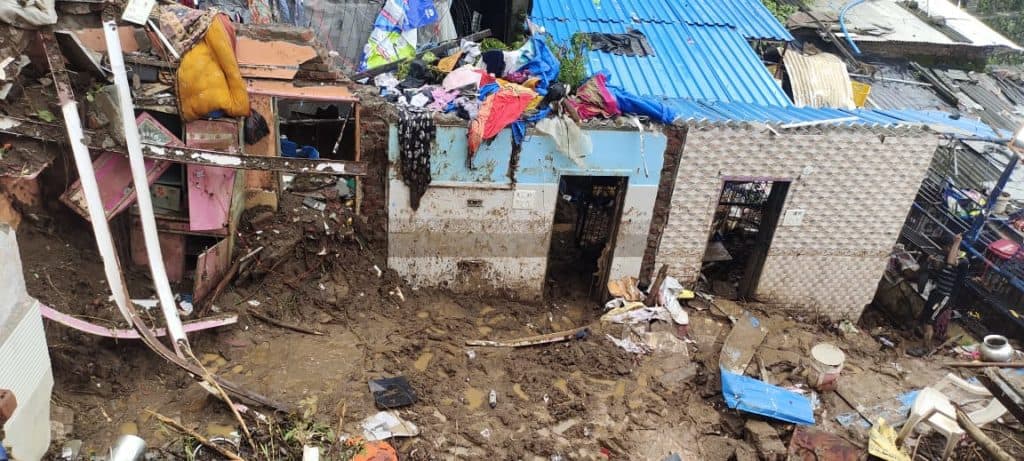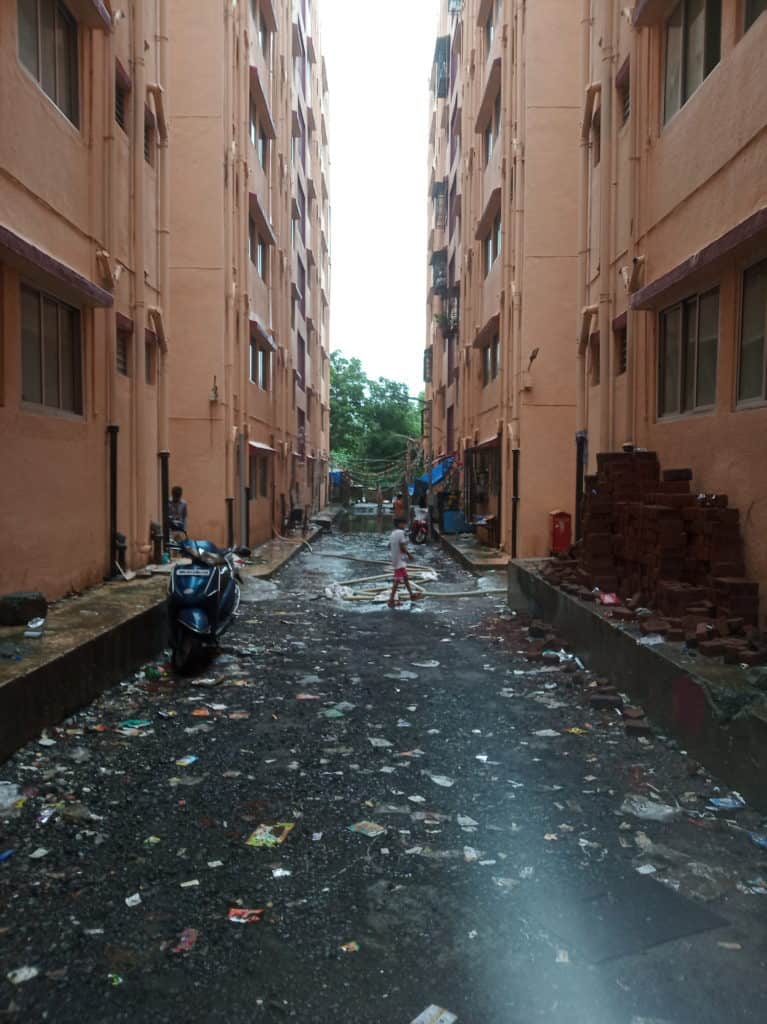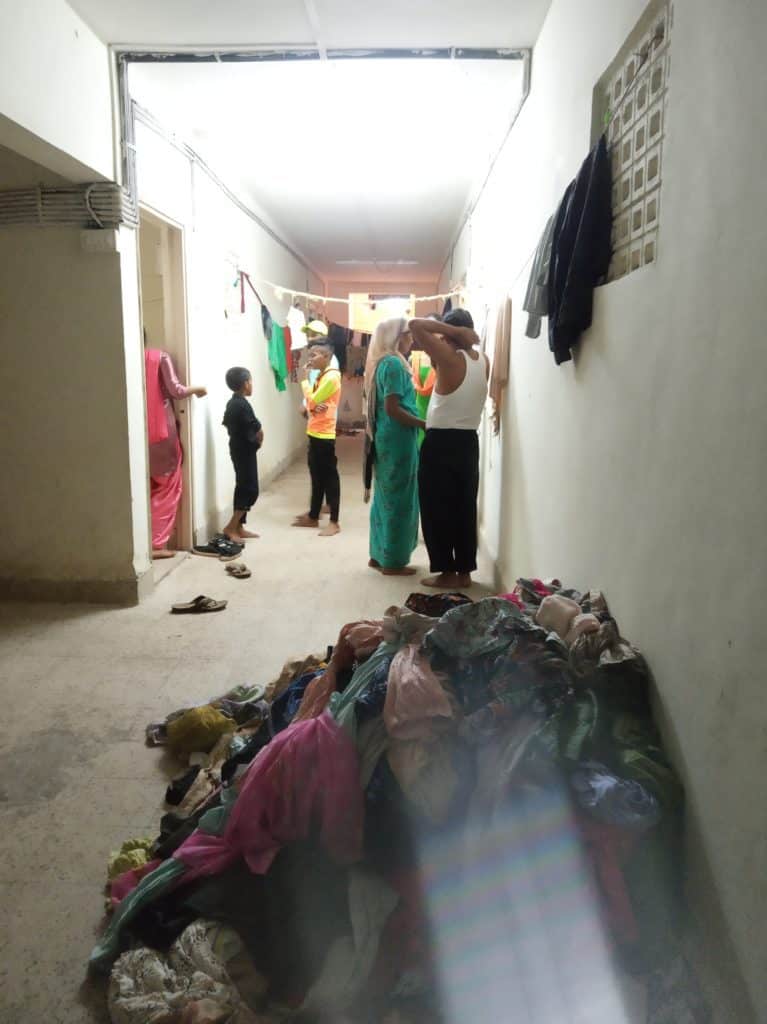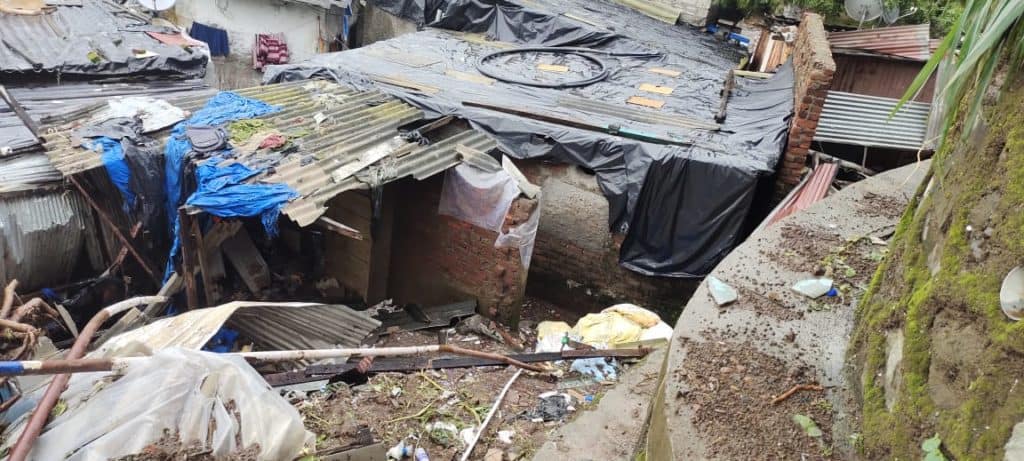On 17 June 2021, landslides in Chembur and Vikhroli killed more than 30 people, injured many others and destroyed several houses. Hanslal lost his entire family in the Vikhroli landslide. He lived in a one-room house, paying Rs 3,000 as monthly rent – a price he could thankfully afford in the absence of work and social security during the pandemic. He worked as a carpenter and was out of work in the past few months.
Hanslal is aware that both the Union and the State Governments have announced compensation, but he is not hopeful of receiving the money because he hasn’t received any help from the administration after the landslide.
Affected families were shifted to temporary shelters until heavy rains persist.
The authorities have not announced a plan for a long-term temporary or permanent shelter for the affected families. People don’t want to go back to where their razed down homes stood, fearing more landslides and electrocution.
Having lost their houses and belongings, they don’t know where else to go.
Read more: Mumbaikars were promised houses, but were they delivered?
Mahesh’s home was adjacent to one of the houses damaged in the Chembur landslide. A wall of his house has cracks due to the landslide debris. After living in a tin-shed for 25 years, he had built the house on a 2.5 lakh rupees loan with a 12% interest rate. His family doesn’t feel safe in that area and don’t want to return.
If offered permanent rehabilitation, he will definitely move there. If not, he will have no choice but to repair the broken wall and start living in the landslide prone area again. He has temporarily moved with his family to a rehabilitation colony nearby on a monthly rent of 5,000 rupees. He cannot continue to live on rent as he still has to pay the EMI for the outstanding loan amount.
Mushtaq doesn’t have the choice that Mahesh does. He is a resident of New Bharat Nagar. He said the authorities asked them without an official notice to vacate their houses after the landslide, but did not arrange for temporary shelters. About 150 houses close to the boundary and retainer wall continue to live in the fear of another impending disaster.

Many homes in hundreds of landslide prone areas across Greater Mumbai need immediate evacuation and permanent rehabilitation. If not, climate change induced monsoons will worsen the crisis in the coming years.
Administrative bodies are busy with relief work, and blaming each other for the mishap. Both the Union and the state governments have announced compensation for affected families.
Even after losing his parents and sister to the landslide in Chembur, authorities did not allot Balu Rao a temporary flat in the rehabilitation building. It was only after his uncle wrote a letter to the local Corporator that he was allotted a flat.
The BMC Chief, MPs, MLAs, and Corporators visited the sites of landslides, but no one has promised permanent rehabilitation.

Temporary houses
After the landslide in Chembur’s New Bharat Nagar around 100 people from 25 families were evacuated and temporarily shifted to “safe” sites, in other words, displaced without permanent rehabilitation after having lost their houses.
Hasan Khan, resident of New Bharat Nagar, Chembur, alleged that the process of allocation of flats was arbitrary. About 25 families were approved (unofficially) to be temporarily shifted to the rehabilitation building. However, about 41 families have been relocated. Many families whose houses were damaged in the landslide have not received flats, while many families that have received flats either did not live in the area or were not affected by the landslide at all. He says networks with political persons helped their family and friends access flats.
The site of temporary rehabilitation for the families who were living in New Bharat Nagar is a building in Vishnu Nagar, Chembur, with one-room flats, without furniture or kitchen essentials, and choked toilets.
Families allege they have not received food, clothing and other essentials from the BMC or any other government body.

Instead, NGOs are providing food (mostly khichdi), bottled drinking water, and used clothes. There’s no provision for breakfast or to cook their own food.
People are forced to live in excruciatingly unhygienic conditions. There’s water logging in the compound of the colony, and every corner is littered with household trash. Still water and garbage in monsoon is a health concern.
Landslide debris engulfed everything in Tara’s house in New Bharat Nagar, Chembur. She is aware that the flats are temporary allotments, and they may be asked to move out soon. However, she along with her neighbours are determined to not vacate until they are provided with permanent rehabilitation.
Schools turn into homes
Families who lost their houses but were not allotted temporary shelters in the rehabilitation building have been shifted to a BMC-run school in Chembur. About 33 people from 6 families have been cramped together in two classrooms.
They don’t want to live in the school as they have no place to bathe, women have no privacy and children cannot attend online classes.

A landslide in Panchsheel Chawl, Surya Nagar, Vikhroli damaged five-six houses, killing ten and severely injuring three. About 60-70 people from 20 families were evicted to prevent further loss of life and property. The evacuees were offered alternative shelter in a BMC school in Bhandup, but they chose not to leave their neighbourhood to go so far.
They have moved into the homes of either relatives or friends in the same neighbourhood. Local elected representatives have been providing them with food and other essentials. In this case too, no talk of long term temporary or permanent rehabilitation.